By Suzanne Roberts
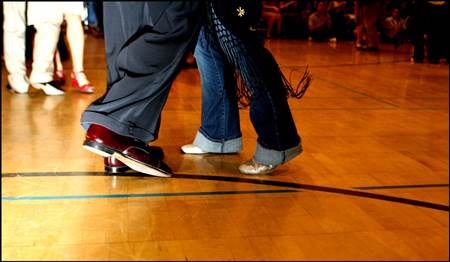 We were on an orange stucco balcony overlooking nothing in particular, overlooking everything: the gray sky, wet with rain, the tangled power lines, the air itself, drenched with humidity. With, it seemed to me, longing. As instructed, we danced in a line, practicing the one-two step of salsa, the music pounding with the cells of my heart. We followed along, mixed up the steps, laughed. The heavy air mixed with our sweat so we could not distinguish between the water of our own bodies and the water of the world. The ceiling fans overhead creaked above, slicing through the rain-soaked air. The sky went dark first with clouds and then with night.
We were on an orange stucco balcony overlooking nothing in particular, overlooking everything: the gray sky, wet with rain, the tangled power lines, the air itself, drenched with humidity. With, it seemed to me, longing. As instructed, we danced in a line, practicing the one-two step of salsa, the music pounding with the cells of my heart. We followed along, mixed up the steps, laughed. The heavy air mixed with our sweat so we could not distinguish between the water of our own bodies and the water of the world. The ceiling fans overhead creaked above, slicing through the rain-soaked air. The sky went dark first with clouds and then with night.
The real trouble in my life has always started in the same way, and maybe it’s that way with everyone, but when I find myself saying, “It’s like I’m in a movie,” I’m in for real trouble.
We were on the balcony, taking salsa dancing. A balding Spanish teacher from Illinois practiced his moves across the room. His movements were so stilted, so gringo, that I couldn’t help but laugh. I embodied myself in a way that afternoon that it felt like I took everyone and everything–the music, the heat, the whirl of the ceiling fans–into my own body. Fluid took on a new definition, and maybe the real one.
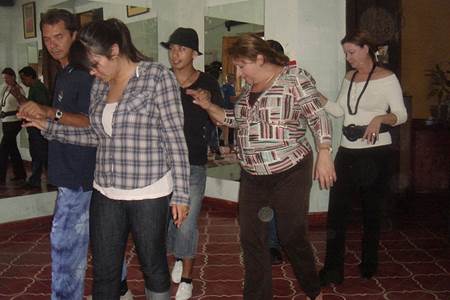 When the instructor told us to pair up, I danced with the balding Spanish teacher, who I learned was named David, and he apologized for stepping on my feet. And for his sweaty palms, which suctioned our hands together. And that’s when the feeling came: that I was looking at myself from above or beyond. And I remembered James Joyce saying that the artist, “like the God of creation, remains within or behind or beyond or above his handiwork, invisible, refined out of existence, indifferent, paring his fingernails.” I had that sense that I was already beyond the experience, that I was looking at myself from the outside. And I thought of myself as an artist, or a writer, though I had not yet thought of myself as a serious writer. I had written only in my journal, and a handful of poems, but I had already come to rely on these ghosts to make sense of my life.
When the instructor told us to pair up, I danced with the balding Spanish teacher, who I learned was named David, and he apologized for stepping on my feet. And for his sweaty palms, which suctioned our hands together. And that’s when the feeling came: that I was looking at myself from above or beyond. And I remembered James Joyce saying that the artist, “like the God of creation, remains within or behind or beyond or above his handiwork, invisible, refined out of existence, indifferent, paring his fingernails.” I had that sense that I was already beyond the experience, that I was looking at myself from the outside. And I thought of myself as an artist, or a writer, though I had not yet thought of myself as a serious writer. I had written only in my journal, and a handful of poems, but I had already come to rely on these ghosts to make sense of my life.
And though I felt outside of myself somehow, the way I do now when I look back on this memory, at the time, at this girl who has not quite fully become a woman, I wanted to watch the rustling palms and feel the body of the new person against mine when we’d screw up our dance steps and bump into each other. So I tried to push James Joyce out of my head and fill it instead with the beat of salsa.
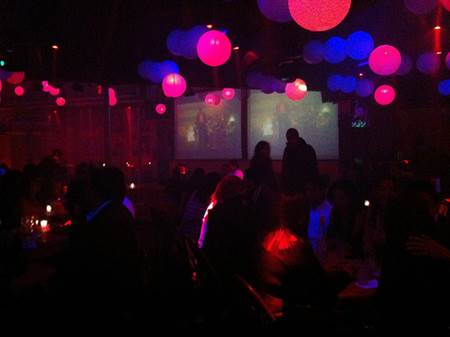 After our dance class, we all went to the zocolo to have a beer, or two, since it was always happy hour there, always “dos por uno,” meaning you had to drink the two beers yourself. You could not order with a partner because even if you tried, the server would set two beers in front of you and two in front of your friend. “Let’s go to the Mambo Café tonight to try out our moves,” someone suggested. After dos por uno, we all agreed. We were studying Spanish in Cuernavaca, and because of the fast friendships , it felt more like summer camp with cerveza.
After our dance class, we all went to the zocolo to have a beer, or two, since it was always happy hour there, always “dos por uno,” meaning you had to drink the two beers yourself. You could not order with a partner because even if you tried, the server would set two beers in front of you and two in front of your friend. “Let’s go to the Mambo Café tonight to try out our moves,” someone suggested. After dos por uno, we all agreed. We were studying Spanish in Cuernavaca, and because of the fast friendships , it felt more like summer camp with cerveza.
The club filled with the sounds of salsa and people who really knew how to move to it. The men smelled of soap and aftershave and wore button-down shirts with tidy jeans and shined-up boots. The women wore skirts that would twirl with black-heeled shoes that wouldn’t stick to the floor. With our Teva sandals and traveler’s clothes, we were out of place.
But I had David to dance with, and when we stepped on each other or bumped into each other, we laughed at each other through the strobe lights.
“I’ve got to go to the bathroom,” he said.
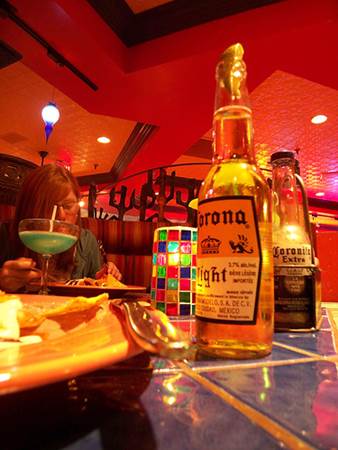 I nodded and went to the bar to order a Corona. I found my new friend Mina in the crowd. We drank our beers and tried to talk over the music, but had to yell through cupped hands and into each other’s ears to hear a word. We were up on a balcony, and I found myself scanning the crowd below for David’s bald head.
I nodded and went to the bar to order a Corona. I found my new friend Mina in the crowd. We drank our beers and tried to talk over the music, but had to yell through cupped hands and into each other’s ears to hear a word. We were up on a balcony, and I found myself scanning the crowd below for David’s bald head.
I had been faithful to my husband Craig in our short ten-month marriage, but somehow I did not see scanning that crowd for David as a transgression. I just wanted to dance with him or even stand next to him. But I had lost him. I felt a surge of disappointment without wanting to admit it, without allowing myself to see that this really was against the rules of my life.
Mina and I decided to head home, so we walked out front. Couples loitered near the entrance of the dance club. The street slickened with rain. And David came up behind me, took my hand, and walked me to the curb where the taxis waited. Mina was staying on the other side of town, so we put her in a cab and then David and I hailed another cab.
Rain splashed on the wipers. Rosary beads swung from the rear-view mirror. David held my hand in the backseat of the taxi. I am not sure if he had ever let it go from the time he took it out in front of the dance club. I do remember thinking that initially he had held my hand so he could help me through the crowd, but he didn’t let it go, and try as I might, I wanted to make up some sort of excuse for why were we holding hands, a reason besides the real reason. I knew this was a transgression, but my mind and my body felt somehow separate, like it did earlier on the balcony, and part of me felt like I was outside of the car, watching as things unfolded.
I was dropped off in front of my homestay.
I hugged David and said, “Have fun in Mexico City.”
“Have fun in Acapulco. I know you will,” he said. “See you Monday at school.”
I felt both relief and disappointment that we were heading off in different directions for the weekend.
I carried the weight of his sweating hand in my palm through the weekend in Acapulco. I replayed the ride in the back of the taxi again and again in my head. Every time I tried to talk myself out of it, I told myself, Nothing happened! It was true. It was a lie. Nothing happened. Everything happened.Â

As Mina and I sat in the sand at the edge of the sea, letting the curtain of water wash over us, I told her about the hand holding in the back of the taxi.
“So what? That’s nothing,” she said.
“Yeah, you’re right,” I said.
“He’s really nice.”
“I know. I know. Probably too nice?”
“Yeah, maybe too nice.”
I watched as plastic forks and cups washed up on the beach, went back out again with the tide.
“This garbage is disgusting,” I said.
“Yeah. And we’re sitting in this filthy water.”
“The thing is,” I admitted, “if it was nothing, how come I can’t stop thinking about it?”
“Hmm,” Mina said. “How much are you thinking about him, like on a scale from one to 10?”
“I don’t know. Maybe a nine.”
“Hmm…nine’s pretty high.” Mina splashed her feet in the water.
“Or maybe even a 10,” I admitted.
“I guess you really are fucked.”
On Monday, David and I made plans to leave after school the next day and take the bus to the historic hill-top silver town of Taxco.
That night, I went back to my room in my homestay and I tried to concentrate on learning the subjunctive tense, but I couldn’t. I didn’t want to go downstairs. The house was owned by an older couple, and the wife worked as a dentist in Mexico City during the week. I knew enough Spanish to exchange pleasantries with the husband but did not feel comfortable going downstairs to watch television with him, though in the afternoons I had taken to watching the novellas, or Mexican soap operas, with the live-in maid Flora. When I watched television with Flora, I didn’t feel like I needed to say anything. I just laughed when she laughed, even if I didn’t get the joke. And she would smile at me, making me feel like I really did understand. She would lay back with her swollen feet propped up on the table, though as soon as she heard a car pull into the courtyard, she pulled her feet off the table and shoved them back into her shoes.
But that night Flora was asleep, and I couldn’t concentrate. While I had not done anything technically wrong, or at least that’s what I told myself, I knew I had. Or at least I was about to. I could clearly see the path I was following, but I couldn’t seem to make myself stop. I have never been a religious person, but I do know that when they say that you can sin with your mind, they–whoever they are–are right. The mind is the first adulterer. What the mind knows, the body feels. And where the body goes, the heart will inevitably follow.
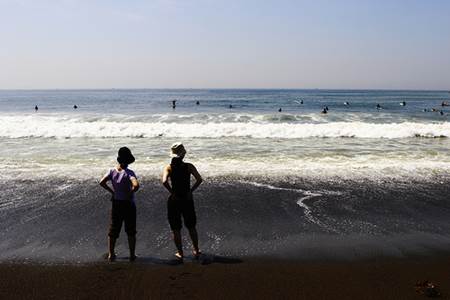
At some level, I knew all of this, so I decided I’d call my husband. I dialed the number on my cell phone and waited.
“Hi, Babe,” I said when he answered.
“Oh hi. What’s up?”
“Nothing. Just wanted to talk.”
“Isn’t it expensive to call on your cell?”
“I don’t know. How are you?”
“Good. Everything’s good.”
I could hear the line click, and then he said, “Hey, that’s Brian calling. I really need to take it. Love ya.”
“Okay. Love you too.”
I pushed the button, ending the call. Then I called my mother.
“How are you? I’m so glad you called,” she said. “How’s the school, the family, the people, the food?”
“I love it, Mom. I love everything.”
“I’m so glad. And I’m glad you called. I was just thinking about you.”
“Hey, Mom, I just called Craig. Brian called him while we were on the phone, and he answered.”
“What?”
“He answered, Mom. I’m calling all the way from Mexico, and Brian is down the street, and Craig answered it.”
“What do you mean?”
“Craig got off the phone with me to talk to Brian.”
“Maybe it was important,” my mother said in a way that made me know that she didn’t think so.
“Maybe,” I said. “It’s okay. I just wanted to tell you everything’s fine.”
Years later, my mother would tell me that she knew at that instant I would leave Craig. She knew, like I did, it had nothing to do with him taking Brian’s call.
I then wrote the following into my journal: I want to live alone in a flat with red tile floors, a ceiling fan, and flowers. I want to sit on my balcony, wearing a white linen dress and drink agua de limon.
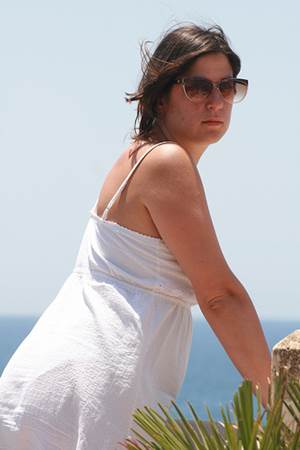 I was looking for something, but I couldn’t name it. All I had for my longing was an image of a woman in a white linen dress, a woman who wasn’t really me, but who was also me in the most profound sense of the word. I realized that what I wanted was the feeling I got from seeing that woman alone. I wanted only for everything to have its place. I wanted to be able to make decisions. To say goodbye as easily as I’d said hello, maybe even go missing for a while. I wanted to look out, which finally means looking in, from the balconies of the world.
I was looking for something, but I couldn’t name it. All I had for my longing was an image of a woman in a white linen dress, a woman who wasn’t really me, but who was also me in the most profound sense of the word. I realized that what I wanted was the feeling I got from seeing that woman alone. I wanted only for everything to have its place. I wanted to be able to make decisions. To say goodbye as easily as I’d said hello, maybe even go missing for a while. I wanted to look out, which finally means looking in, from the balconies of the world.
I didn’t want to have a messy two-year affair with a balding Spanish teacher from Illinois, but I didn’t want my life back at home either. I packed my daypack for Taxco, turned off the light, and listened to the rain, knowing my life was being tugged in a direction I wanted it to go. Or maybe I was doing the tugging? Either way, I wanted the unknown more than I wanted what was known. Or maybe I just wanted an escape from the two words I had come to fear on my path to adulthood: ordinary life.
*****
Suzanne Roberts is the author of the award-winning memoir Almost Somewhere: Twenty-Eight Days on the John Muir Trail, as well as four collections of poetry. Suzanne was named “The Next Great Travel Writer” by National Geographic’s Traveler, and her work appears in many journals and anthologies, including The Pacific Crest Trailside Reader, Tahoe Blues, The Best Women’s Travel Writing, and Southern Sin: True Stories of the Sultry South and Women Behaving Badly. She holds a doctorate in Literature and the Environment from the University of Nevada-Reno and teaches at Lake Tahoe Community College and for the low residency MFA in Creative Writing at Sierra Nevada College. More information may be found on her website.
*****
Photo credits:
Dancing Feet: joel via Flickr
Salsa Lesson: Rey Metzen via Flickr
Mambo Cafe: Steven Zwerink
Corona Beer: Paul Jerry
Holding Hands: Care_SMC
Two Women at a Beach: mrhayata
Woman in White Dress: andrea castelli